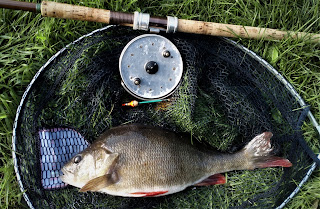For most of us the thought of "escape" is one of the factors that drives us repeatedly to the water's edge; escape from the pressures of work, from the drudgery of chores, from worries about money or health or family - as anglers we have in our possession the secret that the river bank or lakeside has restorative powers of which non anglers remain sadly ignorant. After a particularly frenetic period of work, and with a month passed since my last fishing trip, I was in need of restoration and so along with Pete as my non-household member covid fishing partner, it was back to the perch pond to once again target the specimen perch that live and feed in its murky depths.
There was an added piquancy to this foray to the small, unprepossessing, pond that we have discovered to be the home of monsters, as we were fishing in memory of our friend and fellow Christian Anglers group member John, who lost his battle with cancer last year. In 2019 we had hosted a perch match in his honour, with members attending from around the Country, the largest fish of the day securing its captor's name on the trophy, but this year due to the restrictions around corona virus such an event was impossible, and so for the almost 100 fishermen and women who form the membership of Christian Anglers the whole of November was designated perch month, with the promise of the trophy to whichever member catches the heaviest verified perch during the month.
With clouds scudding threateningly across the sky and against a backdrop of trees most of which had now lost their autumnal glory and whose bare branches clawed finger-like at the menacing darkness above, I tackled up with a vintage glass-fibre avon rod and old Allcocks centrepin reel and dropped a small perch bob float into the margins. The ubiquitous red maggots were dribbled into the swim on a little and often basis, along with chopped worms and prawns. Hookbait was prawn on a size 12 hook.
GK Chesterton once remarked that "if a thing's worth doing, it's worth doing badly", and his quip proved to be an accurate summation of my first few attempts to connect with a fish on the float's disappearance, but eventually I got my timing right and my reward was a fine perch that pulled the scales down to a pleasing 2lb 10 ounces.
Conditions were, to say the least challenging with the wind blowing directly into our faces and whipping the surface of the lake into a constant mesmeric pattern of peaks and troughs, but despite the weather's best efforts the perch continued to make their way to the bank, with a procession of good quality fish ranging from about a pound and a half to a pound and three quarters (the latter of which was weighed, the others merely estimated.)
Pete, who almost always out fishes me, was for once struggling and although he also caught a steady stream of fish, his were all small with none exceeding about half a pound in weight. As Pete is generally a more competent (and determined) angler than me, I can only surmise that for some idiosyncratic reason the perch had, on this occasion, decided to form an orderly queue in my swim in preference to his.
In addition to the perch I also landed a small chub of about a pound and a fish which, in the water, looked as if it would be a new personal best roach but which turned out, to my mild disappointment, to be an ide of just under 2 lb.
At 1 o'clock I drew stumps, aware that the real world beckoned and that to stay and catch more might be to trespass on my own good fortune, and even perhaps take some of the shine off what had been a splendid morning.
As I packed away my tackle I paused to take in what I could see; the little lake that fuels so many of my dreams, the friends with whom I fish, the trees, the ripple on the water's surface and the reflections just beneath it, and as I looked and mused, I thought of John and felt myself enveloped by a momentary sense of peace. We had spent the morning looking to earn our angling stripes by catching a fish emblazoned with stripes, but as my gaze took in all around me, I reaffirmed my trust in the fact that for John even now, and for me at some future point when my mortal life reaches its close, our permanent eternal healing, as the Biblical prophet Isaiah pointed out, is secured by Someone else's stripes.


















































